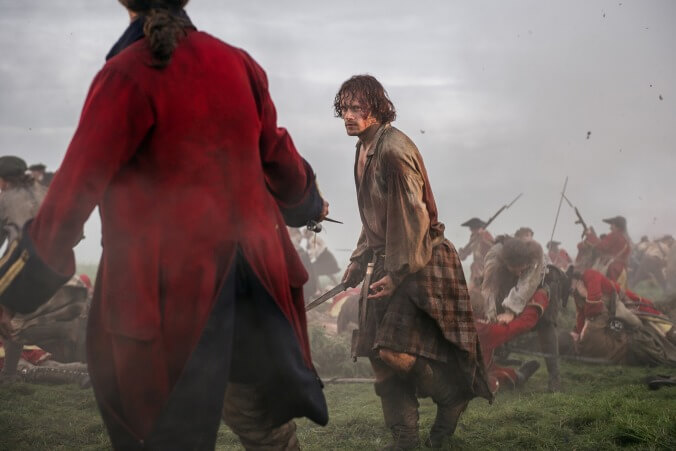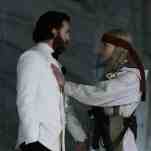It’s a strange choice to show the battle in flashback, sucking out some of its urgency. Instead of living in the action, we revisit it through Jamie’s eyes. It runs the risk of being anticlimactic, of reducing such an important battle for the series. But I find this approach to the battle very in tune with Outlander’s storytelling. Instead of making the action of it all the centerpiece of the scenes, Outlander centers Jamie. Instead of continuous action, we’re treated to violent bursts, the juxtaposition between Jamie’s present and the very recent past leaving an echo. We’re seeing the battle as Jamie remembers it or, more accurately, as he chooses to remember it. We know from the body laying on top of him that Jamie has indeed killed his rapist and tormenter Captain Jack Randall at last. But the rendering of their final encounter at the Battle Of Culloden appears at least a little bit heightened by Jamie’s own memory. I doubt they continued to fight after everyone else had fallen, as if they were the only two men left standing. But I believe that’s how Jamie remembers it happening. By showing it through Jamie’s eyes, Outlander brings us even more into the character’s head. We wouldn’t get all of this from a more traditional battle scene. Outlander’s rendering of the Battle Of Culloden focuses less on the spectacle of war and more on Jamie’s specific relationship to it and the catharsis of his one-on-one battle with Randall.
Then we jump to Boston in 1948, and we’re in a different show entirely. Sometimes Outlander weaves many genres together into one cohesive narrative, and sometimes it just straight up jumps between genres. This premiere does the latter, and it largely works, driving an even bigger wedge between our separated protagonists. While Jamie’s mired in the depressing war drama of Culloden’s aftermath, Claire is stuck in a modern-age relationship drama. Claire struggles to fit in in more ways than one in her new life in Boston. The gas stove gives her trouble, so she buys firewood so she can cook over open flame, a pointed longing on her part for her life in a different time and place. She meets an American housewife who reiterates some of the gender constraints of their society. Claire’s expected to cook, clean, and look pretty for her husband’s boss. No matter what time and place she ends up in, Claire’s constantly running up against the patriarchy. Even Frank, a supposedly progressive and nice guy, seems to want Claire to fulfill a specific role. He says he’ll enjoy anything she cooks, but he expects her to cook nonetheless. At a work function, a wildly condescending and sexist coworker of his talks down to Claire, says Frank shouldn’t let her read political columns, and balks at the thought of women being allowed into Harvard medical. He even belittles Claire’s war service as some little patriotic distraction to her real purpose of tending to a husband and house. Claire sits in her discomfort, silent. It’s not like 18th century Scotland was a particularly progressive time for women, but at least Claire was doing more there than cooking and cleaning for her husband. Her new life in Boston is marked with grays and blues instead of the brights reds and greens of the highlands. After coming back through the stones, Claire has been trying to feel normal, but the definition of normal that surrounds her isn’t what she wants to fit into.
The tension between Frank and Claire heightens when she refuses to let him touch her pregnant belly. He throws a fit, saying that she’s still too distant from him, that she’s still stuck in the past. Even though Frank and Claire’s issues involve literal time travel, they come off as very normal and relatable relationship problems. Because the script never explicitly references the time travel aspect. Outlander has always been somewhat subtle about its time travel aspect, making the fantastical premise more grounded. Frank and Claire arguing about the past and another man all sounds real and straightforward. It’s almost easy to forget time travel played any part in this. But Outlander makes their arguing resonate on an emotional level, and the relationship drama that unfurls is tense and captivating.
Between Frank believing he’s entitled to touch her just because they’ve agreed to raise the baby as his and the doctor who ignores Claire’s requests to not be put under during her delivery, Claire struggles to maintain bodily autonomy throughout the episode. Even though she went through the stones willingly, Claire’s return to the 20th century ripped her body away from a time and place and person she was comfortable with. There’s a sense that she’ll never fit again. Her mind is still very much in the past, as evidenced by her preference for open-flame cooking and her general despondency. And it makes sense. She’s carrying Jamie’s baby. That little red-haired girl keeps her tethered to the past, even if her body exists in the present.
Jamie, meanwhile, wants to die. Rupert Mackenzie saves him from the battlefield and takes him to an infirmary of other Jacobites, which is eventually seized by the Redcoats. An officer by the name of Melton orders that they shall all be shot for their treason, including the young boys who were part of the battle. Even though the battle has ended, the violence and death isn’t over. One by one, the Jacobites are taken out back and shot. Jamie, believing he will never see Claire again and knowing that he has not changed the course of history as he had once hoped to, is eager to be put out of his misery. Knowing that Jamie makes it out alive adds a little suspense to the otherwise dreary scenes. As it turns out, Melton’s brother is William Grey, the young man who promised Jamie a debt of honor last season. As we’ve seen before, people took debts of honor and promises very seriously back then. Melton refuses to kill Jamie for the sake of his family’s honor, so he puts him on a carriage to Lallybroch, where Jamie is reunited with his family. It’s a convenient coincidence, but a lot of Outlander hinges on meaningful coincidences that ultimately tie into the show’s sense of fatalism. Even though there’s still darkness ahead, Jamie’s return to Lallybroch is nothing short of magical. Though it’s just beneath the surface right now, Outlander hasn’t lost its sense of hope completely.
Stray observations
- Welcome back to TV Club coverage of Outlander! I’m happy to be here, and I hope Claire and Jamie reunite soon, but I know that will require us jumping forward a couple decades.
- We don’t know for sure whether Murtagh made it out alive or not, so there is hope!
- When Frank rambles off a list of things from British history as a reason for Claire not to seek American citizenship, Claire bristles at the mention of the Stuarts.
- Frank writes the reverend to ask him to do research on Jamie. As we know, Claire doesn’t learn of Jamie’s fate until many years later. Does Frank know all along and not tell her?
- Frank’s version of helping out around the kitchen: taking the kettle off the stove?!
- Frank calls American tea bags “paper diapers.”
- Claire’s hair is gorgeous throughout.








































